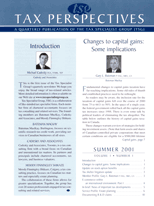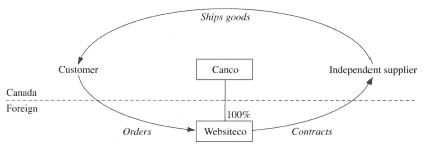
PDF Format
 Issue Contents Issue Contents
 All Issues All Issues
Summer 2001
Volume 1, Number 1
The information in Tax Perspectives is prepared for general interest only. Every effort has been made to ensure that the contents are accurate. However, professional advice should always be obtained before acting and TSG member firms cannot assume any liability for persons who act on the basis of information contained herein without professional advice.
E-commerce Within an International Environment: Part I
By Grace Chow, CA, TEP
Cadesky and Associates LLP (Toronto)
New technology brings new ways of conducting business. The Internet offers these methods to companies of all sizes, and makes it possible to set up shop outside Canada and save large amounts of tax. Since national boundaries are nonexistent in the world of e-commerce, which countries have the right to tax what income? This article provides an overview of the issues to consider when structuring an e-commerce-based business in an international environment.
TYPICAL SCENARIO
Assume that a Canadian-resident corporation (Canco) sells to customers worldwide (including Canada). Sales are made through a Web site located outside Canada that is owned and operated by a non-resident corporation (Websiteco), a wholly owned subsidiary of Canco.  Customers order through the site and Websiteco arranges with Canadian arm's length suppliers to ship goods to customers. (See the illustration.) Customers order through the site and Websiteco arranges with Canadian arm's length suppliers to ship goods to customers. (See the illustration.)
We consider two scenarios using these assumptions. In the first, Websiteco is located in a tax haven that imposes little or no tax. In the second, Websiteco is located in a country with which Canada has a tax treaty.
TAX HAVEN LOCATION
Tax haven countries typically do not have tax treaties with Canada or other G7 countries. If Websiteco is located in a tax haven, from a Canadian tax perspective the key question is whether Websiteco earns income from a business carried on in Canada. If it does, the income is taxable in Canada. If it does not, there will be no tax payable in Canada.
Carrying on business in Canada Under the Canadian Income Tax Act, a non-resident person (such as Websiteco) who "solicits orders or offers anything for sale in Canada through an agent or servant, whether the contract or transaction is to be completed inside or outside Canada," is deemed to be "carrying on business in Canada."
Is Websiteco "soliciting orders"? According to Canadian case law, orders are solicited only if they are sought and attempts are made to obtain them within the jurisdiction-in this case, Canada.
"Offers" has its ordinary meaning in contract law; that is, a contract is created as soon as the offeree accepts the offer. If a Web site merely provides information to invite people to learn more about a product, it seems that orders are not being solicited and goods are not being offered for sale. However, if customers can place orders through the site, it is likely that orders are being solicited.
If the customer is in Canada, orders are presumably being solicited by the Web site activities in Canada. Even if Websiteco approves the orders offshore, it may still be deemed to be soliciting orders in Canada, because the location where the contract or transaction is completed is not the determining factor. Thus it is likely that Websiteco would be deemed to be soliciting orders for sale in Canada.
Agent or servant
Next, we need to ask whether orders are being solicited "through an agent or servant" in Canada. The issue of whether a Web site can be an agent or a servant has been studied by the OECD. In its view, if a Web site is hosted by an Internet service provider (ISP), the ISP will be considered an independent agent acting in the ordinary course of its business. The OECD has also commented that since a Web site is not a person, it cannot be an agent. Thus, if the only connection between Websiteco and Canada is the Web site, which is accessible by Canadian customers through an ISP, it seems safe to conclude that Websiteco does not carry on business in Canada. If Websiteco does not carry on business in Canada, its income will not be taxable by Canada.
Treaty country location
If Websiteco is to have operational connections with Canada or if it wishes to use Canco's services extensively, it should consider locating in a country with which Canada has a tax treaty. Otherwise, these connections could render it taxable by Canada. A treaty will override Canadian domestic law, making business income far less likely to be taxed in Canada. Unfortunately, the tradeoff is that treaty countries have higher tax rates than tax havens.
If Websiteco is located in a treaty country, its business profits are taxable only in the country where it is resident-unless it carries on business in Canada through a permanent establishment. If Websiteco has no permanent establishment in Canada, it will not be taxable.
"Permanent establishment" is generally defined in treaties as a fixed place of business, such as an office, branch, factory, or warehouse. This definition predates the advent of ISPs and Web sites. However, the OECD has suggested that a Web site is not considered a permanent establishment as that term is used in the OECD model tax convention.
Fixed place of business
Although a Web site itself is not a permanent establishment, other factors need to be considered as well. If Websiteco operates its own server, then in the OECD's view the server on which a Web site is operated is a piece of equipment with a physical location, and may thus be considered a fixed place of business.
If the Web site is operated by an ISP, then although it may constitute a fixed place of business, it is not a fixed place of business of Websiteco. Rather, it is a fixed place of business of the ISP. Thus, having the Web site hosted in Canada by an ISP should not, in itself, lead to a Canadian permanent establishment.
The debate over e-commerce and permanent establishments is still going strong. Another OECD task force is considering whether the definition of permanent establishment should be amended to account for e-commerce. If the definition is updated, tax treaties around the world will no doubt be modified as well, but before this occurs there will be many years of tax-planning opportunities.
Readers who are considering extending their business through Web site activity should seek professional advice on doing so in a tax-effective way.
STAY TUNED
The next issue of Tax Perspectives will discuss the tax consequences of taking income out of Websiteco, either back to Canada or to an offshore holding company, and will review some possible treaty and non-treaty countries.
|